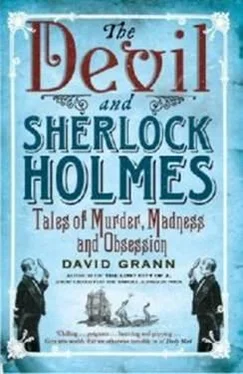As he spoke, he placed the book that he was carrying on the table. It was a worn, battered copy of “Amok.” When I asked Bala about the evidence against him, such as the cell phone and the calling card, he sounded evasive and, at times, conspiratorial. “The calling card is not mine,” he said. “Someone is trying to set me up. I don’t know who yet, but someone is out to destroy me.” His hand touched mine. “Don’t you see what they are doing? They are constructing this reality and forcing me to live inside it.”
He said that he had filed an appeal, which cited logical and factual inconsistencies in the trial. For instance, one medical examiner said that Janiszewski had drowned, whereas another insisted that he had died of strangulation. The judge herself had admitted that she was not sure if Bala had carried out the crime alone or with an accomplice.
When I asked him about “Amok,” Bala became animated and gave direct and detailed answers. “The thesis of the book is not my personal thesis,” he said. “I’m not an anti-feminist. I’m not a chauvinist. I’m not heartless. Chris, in many places, is my antihero.” Several times, he pointed to my pad and said, “Put this down” or “This is important.” As he watched me taking notes, he said, with a hint of awe, “You see how crazy this is? You are here writing a story about a story I made up about a murder that never happened.” On virtually every page of his copy of “Amok,” he had underlined passages and scribbled notations in the margins. Later, he showed me several scraps of paper on which he had drawn elaborate diagrams revealing his literary influences. It was clear that, in prison, he had become even more consumed by the book. “I sometimes read pages aloud to my cellmates,” he said.
One question that was never answered at the trial still hovered over the case: Why would someone commit a murder and then write about it in a novel that would help to get him caught? In “Crime and Punishment,” Raskolnikov speculates that even the smartest criminal makes mistakes, because he “experiences at the moment of the crime a sort of failure of will and reason, which… are replaced by a phenomenal, childish thoughtlessness, just at the moment when reason and prudence are most necessary.” “Amok,” however, had been published three years after the murder. If Bala was guilty of murder, the cause was not a “failure of will and reason” but, rather, an excess of both.
Some observers wondered if Bala had wanted to get caught, or, at least, to unburden himself. In “Amok,” Chris speaks of having a “guilty conscience” and of his desire to remove his “white gloves of silence.” Though Bala maintained his innocence, it was possible to read the novel as a kind of confession. Wroblewski and the authorities, who believed that Bala’s greatest desire was to attain literary immortality, saw his crime and his writing as indivisible. At the trial, Janiszewski’s widow pleaded with the press to stop making Bala out to be an artist rather than a murderer. Since his arrest, “Amok” had become a sensation in Poland, selling out at virtually every bookstore.
“There’s going to be a new edition coming out with an afterword about the trial and all the events that have happened,” Bala told me excitedly. “Other countries are interested in publishing it as well.” Flipping through the pages of his own copy, he added, “There’s never been a book quite like this.”
As we spoke, he seemed far less interested in the idea of the “perfect crime” than he was in the “perfect story,” which, in his definition, pushed past the boundaries of aesthetics and reality and morality charted by his literary forebears. “You know, I’m working on a sequel to ‘Amok,’” he said, his eyes lighting up. “It’s called ‘De Liryk.’” He repeated the words several times. “It’s a pun. It means ‘lyrics,’ as in a story, or ‘delirium.’”
He explained that he had started the new book before he was arrested, but that the police had seized his computer, which contained his only copy. (He was trying to get the files back.) The authorities told me that they had found in the computer evidence that Bala was collecting information on Stasia’s new boyfriend, Harry. “Single, 34 years old, his mom died when he was 8,” Bala had written. “Apparently works at the railway company, probably as a train driver but I’m not sure.” Wroblewski and the authorities suspected that Harry might be Bala’s next target. After Bala had learned that Harry visited an Internet chat room, he had posted a message at the site, under an assumed name, saying, “Sorry to bother you but I’m looking for Harry. Does anyone know him from Chojnow?”
Bala told me that he hoped to complete his second novel after the appeals court made its ruling. In fact, several weeks after we spoke, the court, to the disbelief of many, annulled the original verdict. Although the appeals panel found an “undoubted connection” between Bala and the murder, it concluded that there were still gaps in the “logical chain of evidence,” such as the medical examiners’ conflicting testimony, which needed to be resolved. The panel refused to release Bala from prison, but ordered a new trial.
Bala insisted that, no matter what happened, he would finish “De Liryk.” He glanced at the guards, as if afraid they might hear him, then leaned forward and whispered, “This book is going to be even more shocking.”
– February, 2008

In December of 2008, Bala received a new trial. Once more, he was found guilty. He is currently serving a twenty-five-year sentence.
Which Way Did He Run?
THE FIREMAN WHO FORGOT 9/11
Firemen have a culture of death. There are rituals, constructed for the living, to process the dead. And so on September 11th, when members of Engine Company 40, Ladder Company 35, learned that every man from their house who responded to the World Trade Center attack-twelve, including a captain and a lieutenant-had disappeared, they rushed to the site, determined, at the very least, to perform the rite of carrying out their own. Eventually, they located their engine and ladder trucks, covered in soot, near Ground Zero, and tried to “visualize,” as one of them later put it, what had happened: where the men had gone, what their last movements might have been. By the rigs, the searchers recognized some of the missing firefighters’ extra shoes, a discarded shirt, and a pair of sunglasses. Slowly, in makeshift teams, the searchers fanned out into the rubble, trying to retrace their colleagues’ steps, combing through the wreckage. There was nothing to be found. It was as if the fire had consumed not just the living but the rites of the dead as well.
Then that evening, as the number of missing grew into the thousands, word spread that rescue workers had discovered someone buried under the rubble. He was identified as Kevin Shea, and he was a member of Engine 40, Ladder 35. What’s more, he was alive. He had been evacuated to a hospital in New Jersey, and his colleagues hurried there, believing that he could tell them where the rest of the men might still be trapped. “If there was one,” Steve Kelly, a veteran member of the house, later recalled, “we were hopeful he could lead us to the others.”
When the men entered the hospital room, Shea was lying in bed, awake. He had fractured his neck in three places and severed a thumb, but he seemed alert and happy to see them. After the men embraced Shea, they began to question him. Do you remember where you were? one of them asked.
“No,” he said.
Do you know where the others were before the towers came down?
Shea looked at them, perplexed, and said, “The towers came down?”
Читать дальше












